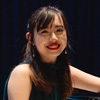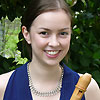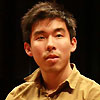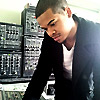Chris Bourke interview - Page 3
Chris: Was Forest, which won the Percy Grainger prize, the turning point.
Douglas: It really was, I think, it was something extraordinary that just happened to me again - we were not encouraged to compose at the University of Canterbury, just get on with your exercises, and I saw this prize offered by Percy Grainger and didn't do a thing about it until a month before the closing date, and then I had a brief Easter Holiday up at Mount Peel in Canterbury and somehow got the urge up there and set to and wrote an orchestra piece. I was in my third year as a student, and heard no more about this until the following November when a reporter and a photographer turned up at my doorstep to congratulate me.
Chris: Had you done orchestration.
Douglas: I'd begun orchestration, yes. I used to study scores, I used to hang around the lounge at the old 3YC of Broadcasting, looking through the plate glass at the orchestra. Also the Classical Hour recitals, because we had no radio or record player. Finally they invited me in because they were a bit puzzled at this strange person behind the glass [laughs] looking at them when they were playing! I was just fascinated.
Chris: Hard for me to imagine the society with no radio or records
Douglas: There was a radio orchestra conducted by Harold Beck which used to broadcast regularly…
Chris: Live, as very few recordings.
Douglas: ...and I don't remember that I knew anybody that played an instrument other than the piano. This is a most extraordinary development, what young people do now - performance, composition.
Chris: Normal thing was for students just to learn the piano.
Douglas: Yes. There was an older tradition of people who played in theatre orchestras -all that came to an end with the slump of the 30s of course - people like Vincent Aspey.
Douglas: The other thing about Forest is that it was performed by the Wellington Symphony Orchestra under Leon de Mauny and the President of the Farmers Union wrote to my father and congratulated him on his son's musical success and I think that was a turning point, in persuading him to send me off to London with a small allowance to study at the Royal College of Music. He was very fair, because he said "Well, I don't know what he's up to, but after all, I had to make a decision to leave Scotland and come to New Zealand" and he was generous in giving me an education and not to expect the farm. It's the old Scottish tradition of course - the eldest son always got the land, and the younger son was packed off to University or became a missionary.
Chris: What was the London scene like.
Douglas: Oh, it was fantastic to arrive at my age having had so little experience of music and opera, ballet, and I was dazzled by it all. The old Queen's Hall was a lovely place for sound and the Sadler's Wells ballet; one would go for next to nothing to stand all through Meistersinger, Don Giovanni.
Chris: Great names of era.
Douglas: Oh definitely - Beecham and Toscanini - we were allowed to go to rehearsals. It was what is called a 'culture shock', and it took me quite a long time to adjust properly. On the other hand there was the very competitive feeling that one had to justify oneself and try to work very hard… and I did manage to win the coveted Cobbett Prize for composition against all comers.
Chris: Who else was a student at the Royal College of Music at this time.
Douglas: Richard Arnell for one - he's a well-known name in British music.
Chris: Vaughan Williams always mentioned.
Douglas: Well, he was a name out here of course, who commanded enormous respect through his music and through his personality too. There were more brilliant people on the scene - William Walton - I had notions of having lessons with him, but I didn't because I don't think he took pupils… colourful people like Constant Lambert… Vaughan Williams used to teach one day a week at the Royal College of Music.
Chris: Vaughan Williams influence an indirect thing.
Douglas: In a technical sense, yes, because he didn't try to teach a good deal of technique, he would leave it to somebody else to study orchestration or 16th Century counterpoint. If you wanted a degree you enrolled at Durham University. But he did have a knack of making one aware of when one was trying to talk sense and when one was trying to display a bit of technique. This was very salutary, that he would unerringly put his finger on the mark when you imagination faltered. It really wasn't until I got back here and learnt from Maurice Clare about string technique and later when the Symphony Orchestra was established I used to drop into the common room down in Waring Taylor Street and ask them about their instruments and write short pieces for them. Vaughan Williams didn't believe in any particular system of music, he just believed that one had to find ones own salvation, which is what he did himself of course through a long apprenticeship period.









